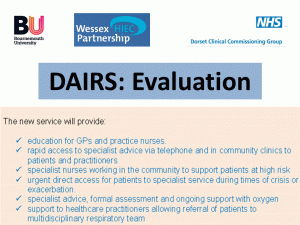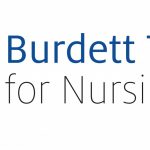 Dr. Janet Scammell in the Faculty of Health and Social Sciences (FHSS) is leading on a new research project evaluating the impact of a new integrated respiratory service in Dorset. The £20,000 mixed-methods research project is funded by the Wessex Academic Health Science Network on behalf of the Dorset Clinical Commissioning Group. Janet Scammell is leading a research team in BU’s new Faculty of Health and Social Sciences comprising Desi Tait, Ashley Spriggs, Martin Hind, Caroline Belchamber and Edwin van Teijlingen.
Dr. Janet Scammell in the Faculty of Health and Social Sciences (FHSS) is leading on a new research project evaluating the impact of a new integrated respiratory service in Dorset. The £20,000 mixed-methods research project is funded by the Wessex Academic Health Science Network on behalf of the Dorset Clinical Commissioning Group. Janet Scammell is leading a research team in BU’s new Faculty of Health and Social Sciences comprising Desi Tait, Ashley Spriggs, Martin Hind, Caroline Belchamber and Edwin van Teijlingen.
The Dorset Adult Integrated Respiratory Service (DAIRS) is a new service that has been set up early 2014 to provide support and care for people with respiratory conditions such as chronic obstructive pulmonary disease (COPD), bronchiectasis and pulmonary fibrosis. The service aims to reduce the number of people who need admission to hospital and help individuals to feel more in control of their condition. BU has been asked to evaluate early uptake and impact of the DAIRS running in Poole, Bournemouth and Dorchester.
Further information about this exciting project is available from: Dr. Janet Scammell, Associate Professor and Professional Lead for Adult and Children & Young People’s Nursing
Telephone: 01202 962751
Email: jscammell@bournemouth.ac.uk
 BU awarded research grant to improve nurse retention
BU awarded research grant to improve nurse retention FHSS PhD student awarded Civil Society Scholar Award (CSSA) by the Open Society Foundations
FHSS PhD student awarded Civil Society Scholar Award (CSSA) by the Open Society Foundations FHSS Dr. Vanessa Heaslip awarded Florence Nightingale Travel Scholarship
FHSS Dr. Vanessa Heaslip awarded Florence Nightingale Travel Scholarship










 Nursing Research REF Impact in Nepal
Nursing Research REF Impact in Nepal Fourth INRC Symposium: From Clinical Applications to Neuro-Inspired Computation
Fourth INRC Symposium: From Clinical Applications to Neuro-Inspired Computation ESRC Festival of Social Science 2025 – Reflecting back and looking ahead to 2026
ESRC Festival of Social Science 2025 – Reflecting back and looking ahead to 2026 3C Event: Research Culture, Community & Cookies – Tuesday 13 January 10-11am
3C Event: Research Culture, Community & Cookies – Tuesday 13 January 10-11am Dr. Chloe Casey on Sky News
Dr. Chloe Casey on Sky News ECR Funding Open Call: Research Culture & Community Grant – Application Deadline Friday 12 December
ECR Funding Open Call: Research Culture & Community Grant – Application Deadline Friday 12 December MSCA Postdoctoral Fellowships 2025 Call
MSCA Postdoctoral Fellowships 2025 Call ERC Advanced Grant 2025 Webinar
ERC Advanced Grant 2025 Webinar Horizon Europe Work Programme 2025 Published
Horizon Europe Work Programme 2025 Published Update on UKRO services
Update on UKRO services European research project exploring use of ‘virtual twins’ to better manage metabolic associated fatty liver disease
European research project exploring use of ‘virtual twins’ to better manage metabolic associated fatty liver disease